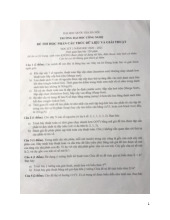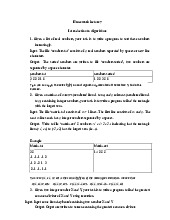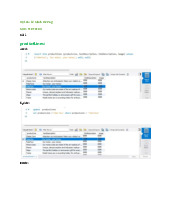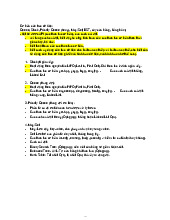



Preview text:
lOMoAR cPSD| 59735516 Homework week 2 Basic data structures
*Note: Two consecutive numbers in the same line must be separated by only one space.
1. Given a list A of n integer numbers, your task is to write a program to
count the number of pairs (i,j) that A[i]=A[j]. Input:
− The first line contains an integer number n
− The second line contains n integer numbers separated by spaces.
Output: Write to the screen an integer number (i.e., the number of pairs (i,j) that A[i]=A[j]) Example Keyboard Screen 6 4 5 2 4 2 2 5
Tips: for each element a[i], count the number of elements a[j] satifying that i
2. The linked list structure has two following operations:
− insert (p, x): insert an integer number x at position p, elements from p
are moved backward one position.
− delete (p): delete element at position p, elements after p are moved forward one position.
Start from an empty list, your task is to implement a linked list, perform
operations read from the keyboard. Input:
− The first line contains an integer number n which is the number of operations.
− The next n lines contain the operation description. One operation is in one line in either format: lOMoAR cPSD| 59735516 ● insert p x ● delete p
where p is the position and x is the number.
Output: Write the resulting linked list to the screen in one line. Numbers are separated by spaces. Example Keyboard Screen 5 1 2 3 insert 0 1 insert 1 3 insert 1 4 insert 2 2 delete 1
Tips: read carefully the representation of a list using linked list and operations
on linked list in the lecture 2.
3. Given a list of integer numbers, your task is to read these numbers into a
doubly linked list, and implement function count_triplets() to count all
positions p such that the sum of elements at positions p-1, p, and p+1 is zero. Input:
− The first line contains an integer number n which is the number of numbers.
− The second line contains n integer numbers to read into count_triplets function
Output: Write to the screen an integer number that is the result of function count_triplets(). Example Keyboard Screen 6 2 5 -3 -2 2 9 -11
Tips: read carefully the representation of a list using doubly linked list and
operations on linked list in the lecture 2. lOMoAR cPSD| 59735516
4. The Queue structure has two following operations:
− enqueue (x): insert integer number x at the tail the queue.
− dequeue (): remove the element at the head of the queue.
Start from an empty queue, your task is to implement a queue, perform
operations from the keyboard and write the resulting queue to the screen. Input:
− The first line contains an integer number n which is the number of operations
− The next n lines contain the operation description. One operation is in one line in either format: ● enqueue x ● dequeue
where x is the number to enqueue
Output: Write the resulting queue to the screen. Numbers are separated by spaces. Example Keyboard Screen 7 3 4 5 enqueue 1 enqueue 2 enqueue 3 enqueue 4 dequeue dequeue enqueue 5
5. The Stack structure has two following operations:
− push (x): insert integer number x to the top of the stack
− pop (): remove the element at the top of the stack
Start from an empty stack, your task is to implement a stack, perform
operations from the keyboard and write the resulting stack to the screen lOMoAR cPSD| 59735516 Input:
− The first line contains an integer number n which is the number of operations
− The next n lines contain the operation description. One operation is in one line in either format: ● push x ● pop
where x is the number to push to the stack.
Output: Write the resulting stack to the screen. Numbers are separated by spaces. Example Keyboard Screen 7 1 2 5 push 1 push 2 push 3 push 4 pop pop push 5



